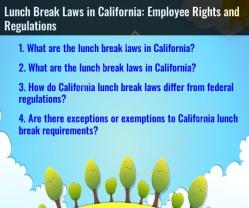Why is Texas an at-will employment state?
Texas, like many other U.S. states, follows the principle of at-will employment. At-will employment means that both employers and employees have the freedom to terminate the employment relationship at any time, for any reason (with some exceptions), and without prior notice. There are several historical and legal reasons why Texas and many other states have adopted at-will employment:
Common Law Tradition: The concept of at-will employment has its roots in the common law legal tradition that the United States inherited from England. In this tradition, employment relationships were generally seen as voluntary agreements between employers and employees, which either party could terminate without a specific contractual obligation.
Employer Flexibility: At-will employment is often viewed as giving employers the flexibility to make staffing decisions based on changing business needs. Employers can hire and fire employees without the need for specific justifications, making it easier to adjust their workforce as circumstances dictate.
Economic Freedom: Proponents of at-will employment argue that it promotes economic freedom and a free-market approach to labor. It allows both employers and employees to negotiate employment terms and conditions without undue government intervention.
Simplicity: At-will employment simplifies the employment relationship. It avoids the need for complex employment contracts with specific termination clauses and reduces the potential for legal disputes over termination reasons.
Preservation of Employee Rights: While at-will employment provides employers with flexibility, it doesn't negate important legal protections for employees. Employees still have rights under federal and state employment laws, including anti-discrimination, wage and hour, and workplace safety protections. At-will employment doesn't give employers the right to terminate employees for illegal reasons, such as discrimination based on race, gender, or other protected characteristics.
Employment Contracts: In Texas and other at-will employment states, employers have the option to enter into employment contracts that specify terms and conditions of employment, including reasons for termination. These contracts can modify the default at-will employment relationship to provide additional job security for employees.
It's important to note that while at-will employment is the default in Texas, there are exceptions and limitations to the doctrine. For example, employers cannot terminate employees for reasons that violate federal or state anti-discrimination laws, breach of contract, retaliation, or in violation of public policy. Additionally, employment contracts, collective bargaining agreements, and company policies can modify the at-will relationship and provide additional protections for employees.
As employment laws can vary by state and change over time, individuals with concerns about their employment rights or the termination of their employment should seek legal advice or consult with an employment attorney to understand their specific situation and rights under Texas law.
Definition and Implications of At-Will Employment in Texas
At-will employment is a legal term that refers to an employment relationship in which either the employer or the employee can terminate the relationship at any time, for any reason, or for no reason at all. Texas is an at-will employment state, meaning that most employees in Texas can be fired for any reason, or no reason at all, as long as the reason is not illegal.
There are a few exceptions to at-will employment in Texas. For example, employees cannot be fired for reasons that violate public policy, such as refusing to commit a crime or reporting illegal activity. Employees also cannot be fired for reasons that violate their employment contract, if they have one.
Implications of At-Will Employment
The implications of at-will employment are significant for both employers and employees. For employers, at-will employment means that they have flexibility to terminate employees who are not performing well or who are no longer needed. However, at-will employment also means that employers must be careful to avoid firing employees for illegal reasons, such as discrimination or retaliation.
For employees, at-will employment means that they can be fired at any time, for any reason. This can make employees feel insecure in their jobs, and it can make it difficult to negotiate better wages and benefits. However, at-will employment also means that employees have the freedom to quit their jobs at any time, without giving notice.
Limits to At-Will Employment and Wrongful Termination Protections
There are a few limits to at-will employment in Texas. For example, employees cannot be fired for reasons that violate public policy, such as refusing to commit a crime or reporting illegal activity. Employees also cannot be fired for reasons that violate their employment contract, if they have one.
In addition, Texas has a number of wrongful termination laws that protect employees from being fired for certain reasons. For example, employees cannot be fired for:
- Discrimination on the basis of race, color, religion, sex, national origin, age, disability, or veteran status
- Retaliation for filing a discrimination claim or for participating in a discrimination investigation
- Refusing to commit a crime or reporting illegal activity
- Taking time off for family and medical leave
- Exercising their right to free speech or association
How Texas Employment Laws Differ from Other States
Texas employment laws differ from other states in a number of ways. For example, Texas is an at-will employment state, while some other states, such as California, have more restrictive employment laws. Additionally, Texas does not have a state minimum wage law, while some other states do.
Here are a few other key differences between Texas employment laws and the laws of other states:
- Overtime pay: Texas follows the federal overtime pay rules, which require employers to pay employees overtime (time and a half) for any hours worked over 40 hours in a week. However, some other states have more generous overtime pay rules.
- Non-compete agreements: Non-compete agreements are generally enforceable in Texas, but some other states have stricter laws on non-compete agreements.
- Severance pay: Texas does not have a law requiring employers to provide severance pay to terminated employees. However, some other states do have severance pay laws.
If you have any questions about your employment rights in Texas, you should consult with an employment attorney.












